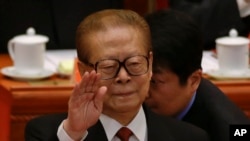BEIJING —
China's Foreign Ministry called on Spain on Friday to prevent the launch of further lawsuits which seek to probe alleged Chinese rights abuses in the restive region of Tibet.
Two Tibetan support groups and a monk with Spanish nationality brought a case against former Chinese president Jiang Zemin and ex-prime minister Li Peng in 2006 over allegations they committed genocide in Tibet.
They were using a Spanish law which allows suspects to be tried for human rights abuses committed abroad when a Spanish victim is involved.
The two former leaders, and three other high-ranking officials who worked in the government in the 1980s and 1990s, are accused of human rights abuses in the Himalayan region.
In the latest move in the case, a Spanish judge this week rejected an appeal by the public prosecutor against the issuing of arrest warrants for Jiang and Li, originally made in November.
Chinese Foreign Ministry spokesman Hong Lei said Beijing was asking Madrid to “clarify” what was happening and expected Spain to prevent such cases from recurring.
“The Tibet issue is a core interest for China and the feelings of the people, and is extremely sensitive,” Hong told a daily news briefing.
He said China hoped Spain would, “not send a wrong message to Tibetan separatist forces,” and take steps, “not to allow Spanish territory to be used for anti-China splittist activities,” and to “prevent such incidents from happening again.”
Communist Chinese troops took control of Tibet in 1950. China maintains that it “peacefully liberated” the remote region, which it says was mired in poverty, exploitation and economic stagnation.
Exiles and rights groups say China tramples on the religious, cultural and linguistic rights of Tibetans and enforces its rule using brutal methods.
Though it is unlikely Jiang or Li will end up in a Spanish dock, the case is reminiscent of the arrest of former Chilean dictator Augusto Pinochet in London in 1998 after a warrant was issued by former Spanish magistrate Baltasar Garzon.
The Spanish government is pushing on with a reform of this law that would restrict the capacity of Spanish judges to act to national borders.
In October, another ruling by the same Spanish court indicted former Chinese president Hu Jintao for alleged genocide in Tibet. China's government denounced that move as interfering in its internal affairs.
Two Tibetan support groups and a monk with Spanish nationality brought a case against former Chinese president Jiang Zemin and ex-prime minister Li Peng in 2006 over allegations they committed genocide in Tibet.
They were using a Spanish law which allows suspects to be tried for human rights abuses committed abroad when a Spanish victim is involved.
The two former leaders, and three other high-ranking officials who worked in the government in the 1980s and 1990s, are accused of human rights abuses in the Himalayan region.
In the latest move in the case, a Spanish judge this week rejected an appeal by the public prosecutor against the issuing of arrest warrants for Jiang and Li, originally made in November.
Chinese Foreign Ministry spokesman Hong Lei said Beijing was asking Madrid to “clarify” what was happening and expected Spain to prevent such cases from recurring.
“The Tibet issue is a core interest for China and the feelings of the people, and is extremely sensitive,” Hong told a daily news briefing.
He said China hoped Spain would, “not send a wrong message to Tibetan separatist forces,” and take steps, “not to allow Spanish territory to be used for anti-China splittist activities,” and to “prevent such incidents from happening again.”
Communist Chinese troops took control of Tibet in 1950. China maintains that it “peacefully liberated” the remote region, which it says was mired in poverty, exploitation and economic stagnation.
Exiles and rights groups say China tramples on the religious, cultural and linguistic rights of Tibetans and enforces its rule using brutal methods.
Though it is unlikely Jiang or Li will end up in a Spanish dock, the case is reminiscent of the arrest of former Chilean dictator Augusto Pinochet in London in 1998 after a warrant was issued by former Spanish magistrate Baltasar Garzon.
The Spanish government is pushing on with a reform of this law that would restrict the capacity of Spanish judges to act to national borders.
In October, another ruling by the same Spanish court indicted former Chinese president Hu Jintao for alleged genocide in Tibet. China's government denounced that move as interfering in its internal affairs.





